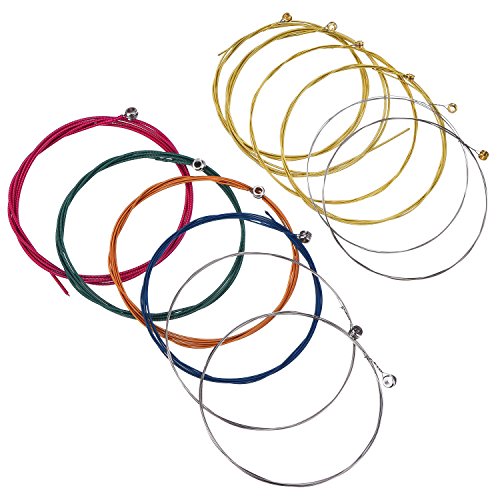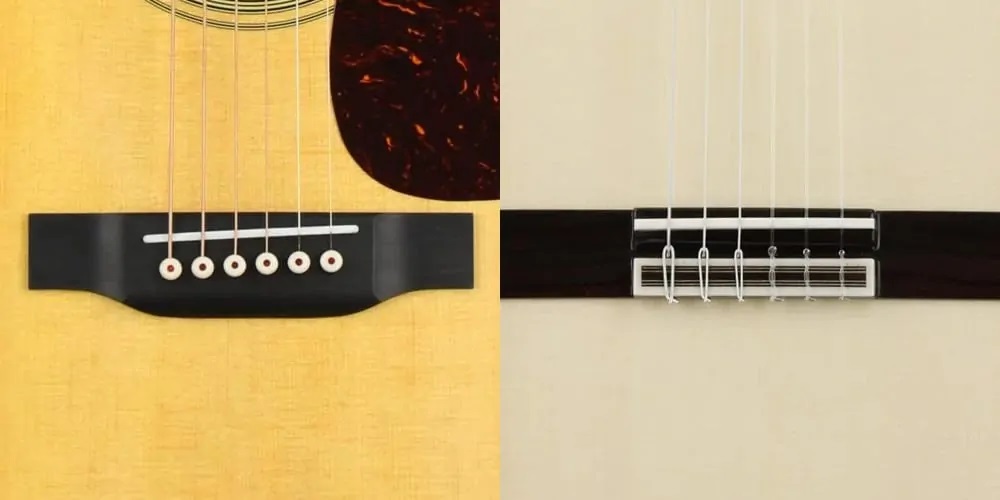Table of Contents
Nylon vs Steel Strings
Introduction
When playing guitar, one of the most common questions you will have is what the difference is between steel strings and nylon strings. There appears to be a preference among everyone, and everyone has a unique story to tell.
There are many differences between steel strings and nylon strings, from their ease of use to their cost. There is even a difference in the sounds they produce, as well as the methods of care they require. In the end, there is no one-string-fits-all solution, but by the end of this article, you will know what string you require.
There will be an explanation of the differences, as well as the answers to your many questions. We hope you will continue reading to find your perfect string and spend your time focusing on the music rather than worrying about whether or not it is right for you.

Nylon vs Steel Strings: Physical Differences
There are many differences between nylon strings and steel strings, most of which lie in the way they sound or operate, although there are some physical differences as well. This physical difference is what makes each type of string unique.
Strings made of steel tend to be thinner, which is why they produce an echoing and twangy sound in the music genres in which they are used. Steel and nickel strings are typically used, with pure steel and nickel strings becoming increasingly popular. It is also common for steel strings to be coated with nickel, which enables them to produce a greater range of tones than pure steel strings.
Due to the material in which nylon strings are made, they are much thicker than steel strings. This makes them more flexible, however, they do not have the ability to hold as high of a tone as steel strings. In spite of this, they are much softer strings, which offers a number of advantages.
On a guitar, however, you may find both nylon and steel strings because when used in combination, they can create a wide variety of tones and notes. You will still have to replace both steel strings and nylon strings more frequently than if you were only using steel strings.

Nylon vs Steel Strings: Sound Differences
As compared to steel strings, nylon strings produce a mellower sound. Flamenco and classical musicians frequently use these types of strings. This string is recommended for students who are still in the process of learning the art.
A classical guitar has a wider neck than an acoustic guitar with steel strings. It follows that the neck profile is also typically larger, although there are models that may have a more flattened C shape. It is surprising how comfortable these guitars are to play despite their wider necks.
When it comes to tone, steel strings are louder and brighter. Compared to nylon strings, they also have larger bodies. In most cases, country-western, folk, Celtic, pop, and rock musicians prefer the grittier sound of these strings.
As a result, guitars that use this type of string have a stronger brace within their bodies and a reinforced bridge.
Nylon vs Steel Strings Pros and Cons
Nylon Strings Pros
There is no doubt that nylon strings do not possess the twang and volume required to produce the next great rock song, but they are a popular choice for the production of softer, more romantic music. The nylon-string guitar is an excellent choice for those who prefer a more gentle and mellow sound.
It is more comfortable to play them for extended periods of time due to the fact that they are not made of steel, which makes them less hard on your fingers. A player who is new to the game should practice frequently in order to acquire the fundamentals of the game.
Nylon Strings Cons
You should not expect to be able to play most songs from the radio if you purchase a nylon-string acoustic guitar. The nylon-string guitar lacks the power required to play most contemporary music, so these will be difficult to play.
In addition, you will not be able to practice solos or anything else that requires you to play higher up the neck of the guitar. Nylon-string guitars have bodies that begin at the 12th fret, whereas steel-string guitars begin at the 14th fret, so the higher frets are not accessible.
Steel Strings Pros
It is likely that you have noticed that the majority of acoustic guitar music uses steel strings. Steel strings are most commonly chosen by musicians due to their sound and volume. Strings made of steel are known for their loud, sharp, twangy sound.
You may benefit from choosing a steel string if you intend to learn to play guitar by learning the classics or popular songs you hear on the radio. The long neck of steel-string guitars is another advantage.
An acoustic guitar with a longer neck allows players to play higher on the neck, enabling easier soloing and high-fret work. Steel-string guitars have another major advantage in that their strings are more resistant to heat.
Steel Strings Cons
It is evident that steel strings require more pressure from the player to produce sound due to the fact that they are made of steel. For those who are new to the guitar, this can be quite painful at first. In order to feel comfortable playing for extended periods of time, you must develop the toughness in your fingers over time.
In addition, new ones require more tuning when they are first installed, even though they require less tuning in general. Beginners may find it frustrating to tune their guitar properly, play a few chords, and then discover that it does not sound right.
Wanna check our preference for strings when it comes to ukulele? You will be able to find more about it here!

Conclusion
Our best recommendation is to go with your personal preference. You can try out steel-string and nylon-string guitars in an instrument store if you do not have access to one at home.
You will be able to determine which strings suit you best. In these stores, especially entry-level guitars, it is important to keep in mind that the guitars are rarely set up. These instruments may have a high action, which makes them more difficult to play.
It is also possible that the strings are inexpensive. Cheap strings are not a problem as long as they sound good. Nevertheless, the price of strings often reflects the quality of the sound they will produce. When you are just getting started, you do not have to worry about this issue too much. In the beginning, these strings should be sufficient for your needs.
In case you are having any question in regards to the comparison between the nylon and the steel strings, or any other difference to mention, feel free to let us know in the comment section below and we will be happy to update and make the article even more detailed!







